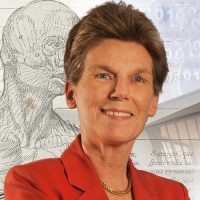Session 1 Health disparities and the social factors on disease risk and outcomes
Chair: Dr. Suzanne B. (Sue) Bakken
Jessica Ancker, PhD
Professor and Vice Chair for Educational Affairs, Department of Biomedical Informatics
Vanderbilt University Medical Center
Bio to be available soon.

Bradley Iott, PhD
Research Assistant Professor
University of Michigan
Bio to be available soon.
Anne Moen, PhD
Professor, Department of Public Health Science
University of Oslo
Bio to be available soon.
Jessica Tenenbaum, PhD
Associate Professor of Biostatistics & Bioinformatics
Duke University
Dr. Jessie Tenenbaum is an Associate Professor at Duke University in the Department of Biostatistics and Bioinformatics. Her research focus is on mental health informatics and data science methods to improve whole person health. Dr. Tenenbaum recently concluded a five-year tenure as the Chief Data Officer for the North Carolina Department of Health and Human Services (NC DHHS). In this role, she spearheaded numerous initiatives to enhance data-driven decision-making and improve public health outcomes across the state. Nationally Dr. Tenenbaum has served as an Associate Editor for the Journal of Biomedical Informatics, an elected member of AMIA’s Board of Directors, and on the Board of Scientific Counselors for the National Library of Medicine. She is also an elected Fellow of the American College of Medical Informatics.
Session 2 The role of AI in healthcare — trustworthiness, transparency, equity, and fairness
Chair: Dr. Tianxi Cai
Hongfang Liu, PhD
Professor, Vice President of Learning Health System
University of Texas Health, Houston
Hongfang Liu, is D. Bradley McWilliams Chair Professor at McWilliams School of Biomedical Informatics and serves as Vice President of Learning Health System at UTHealth Houston. She is directing the Center for Translational AI Excellence and Applications in Medicine (TEAM-AI). She has a broad range of informatics expertise including artificial intelligence and informatics in healthcare, computational biology and bioinformatics, and biomedical data science. Her research has been recognized through several awards, including the NSF CAREER Award for biomedical text mining, the NCATS Innovation Award for open health natural language processing, the AMIA Donald Lindberg Award in Informatics Innovation for context-aware artificial intelligence, and the CPRIT Established Investigator Recruitment Award. Her current research focus is to advance translational science and bring novel data science, informatics, and AI solutions to empower real-world data-driven research.

Hua Xu, PhD
Robert T. McCluskey Professor
Vice Chair for Research and Development, Department of Biomedical Informatics and Data Science
Assistant Dean for Biomedical Informatics, School of Medicine
Yale University
Dr. Hua Xu is Robert T. McCluskey Professor and Vice Chair for Research and Development, Department of Biomedical Informatics and Data Science at Yale School of Medicine (YSM), as well as Assistant Dean for Biomedical Informatics at YSM. He received his Ph.D. in Biomedical Informatics from Columbia University. His primary research interests include biomedical natural language processing (NLP) and data mining, as well as their applications in secondary use of electronic health records data for clinical and translational research. His research is funded by multiple agencies (i.e., NLM, NCI, NIGMS, NIA, AHA, and CPRIT), and methods/tools developed in his lab have been widely used to support diverse biomedical applications. He served as the Chair of the NLP Working Group at American Medical Informatics Association (AMIA) and now leads the NLP Working Group at Observational Health Data Sciences and Informatics (OHDSI). Dr. Xu is a fellow of both the American College of Medical Informatics (ACMI) and the International Academy of Health Sciences Informatics (IAHSI).
Marzyeh Ghassemi, PhD
Associate Professor of Electrical Engineering and Computer Science
Massachusetts Institute of Technology
Bio to be available soon.

Jessica Gronsbell, PhD
Assistant Professor of Statistics
University of Toronto
Bio to be available soon.
Session 3 The foundation and history of informatics in health
Chair: Dr. William R. (Bill) Hersh

Marion Ball, Ed.D.
Professor, Bioengineering
University of Texas at Arlington
Dr. Marion Ball is an international innovator, educator, author, and member of the National Academy of Medicine (NAM) with over forty-five years of experience in the healthcare IT community. Her research focuses are on health informatics, curriculum design, education, and research towards bringing enabling technology from theory into practice. Dr. Ball served and continues to serve on a variety of boards, i.e., the Board of Regents of the National Library of Medicine (NLM), President of the International Medical Informatics Association (IMIA), board member of the American Medical Informatics Association (AMIA), Health on The Net (HON), College of Health Information Management Executives (CHIME), American Health Information Management Association (AHIMA), Co-Chaired the Health Information Management Systems Society (HIMSS) and the International Academy of Health Sciences Informatics (IAHSI). She is a founding member of the TIGER (Technology Informatics Guiding Education Reform).
Dr. Ball received numerous awards for her contributions to the world and was named as one of the Most Influential Women in Health IT by HIMSS. She also was awarded the high honor given by AMIA, the Morris Collen Award, as well as the Francois Grémy award, the highest honor given in Health Informatics, given by IMIA. Dr. Ball has over 400 publications in textbooks, journal articles, and book chapters.
Don Detmer, MD, MA
Professor of Medical Education, Department of Public Health Services
University of Virginia School of Medicine
A native of Kansas, Professor Don Detmer has held academic appointments at Wisconsin-Madison, Utah, Virginia, Cambridge, and UCL (honorary) in a variety of disciplines including Medicine, Business Administration, Medical Informatics, and Preventive Medicine. Detmer practiced vascular surgery for thirty years after training at Kansas, NIH, and Duke. Also, while in Madison, he developed a Master’s Program in Administrative Medicine. Additional appointments included VPHS at Utah and Virginia, President of the Medical Staff (Wisc.), Gillings Prof. of Health Management at Cambridge, President and CEO of AMIA, and Medical Director of Policy and Advocacy of the ACS plus Board chair appointments with the Board of Regents, NLM; Health Care Services, NAM/IOM; NCVHS; plus Vice-chair of the China Medical Board and North American Truffle Growers Association. His professional fellowships include the Am. Colleges of Med. Informatics, Surgeons, and Sports Medicine, the AAAS, the IAHSI, American Academy of Nursing (hon.) and AAPA (hon.) and membership in the Blue Ridge Health Group which he founded in 1995. Research related to surgery included development of hospital-based ambulatory surgery while at Duke followed with a major focus on chronic compartment and medical tibial stress syndromes. His policy development work includes national health information infrastructures including EHRs, quality and safety of health care, professionalizing clinical informatics as a discipline and, very recently, health protection. Don received teaching awards at Duke and Wisconsin. Currently, he farms outside Charlottesville and enjoys chainsaw sculpturing, pickleball, and using his farm equipment.

Betsy L. Humphreys, MLS
Retired, former Deputy Director
National Library of Medicine, National Institutes of Health (NIH)
Betsy L. Humphreys was appointed the National Library of Medicine’s (NLM) Deputy Director in 2005. NLM is one of the 27 Institutes and Centers that comprise the National Institutes of Health. From April 1, 2015 – August 14, 2016, she also served as NLM’s Acting Director. As Deputy Director, Humphreys shared responsibility with the Director for overall program development, program evaluation, policy formulation, direction and coordination of all Library activities. Humphreys, who joined the NLM in 1973, previously led the NLM’s Library Operations Division and directed the Unified Medical Language System (UMLS) project, which produces knowledge sources to support advanced processing, retrieval, and integration of information from disparate electronic information sources. Ms. Humphreys is an elected member of the National Academy of Medicine, a Fellow of the American College of Medical Informatics, a Fellow of the Medical Library Association, and an inaugural Fellow of the International Academy of Health Sciences Informatics. She is the recipient of a number of awards, including the Morris F. Collen Award of Excellence from the American College of Medical Informatics, the Marcia C. Noyes Award, the first Cornerstone Award conferred by the Association of Academic Health Sciences Libraries, and the President’s Meritorious and Distinguished Rank Awarda, Senior Executive Service.
Casimir Kulikowski, PhD
Professor of Computer Science
Rutgers University
Casimir A. Kulikowski is Board of Governors Professor of Computer Science at Rutgers – The State University of New Jersey. He carries out research on biomedical informatics, pattern recognition, historical informatics, and artificial Intelligence. He founded and chaired the History Working Group of the International Medical Informatics Association (IMIA) from 2011 to 2023, and leads the American College of Medical Informatics (ACMI) Committee of Historians. Kulikowski organized the first AI in Medicine (AIM) Workshop in 1975 at Rutgers, bringing together biomedical and clinical researchers with knowledge-based AI researchers to build a community for scientific inquiry and clinical decision-support. With Sholom Weiss he developed an innovative causal-association network (CASNET) model applied to glaucoma, a compiled rule-based framework EXPERT, producing the first medical expert system on a chip incorporated into a commercial clinical instrument – Helena Labs’ Clinical Densitometer for Serum Electrophoresis analysis. Their Rutgers team also developed knowledge representations for the collaborative AI/RHEUM Decision Support System, and the first hand-held expert system for infectious eye disease screening deployed in Africa and sponsored by WHO, followed by AI models for MRI imaging systems, and novel AI bioinformatics methods for macromolecular and protein structural and functional data analysis. Kulikowski co-authored books on A Practical Guide to Designing Expert Systems (1984), and Computer Systems that Learn: Techniques from Statistics, Neural Nets, Machine Learning, and Expert Systems (1991), co-edited the IMIA Yearbook of Medical Informatics from 2001 to 2012, and the IMIA eBook summarizing international medical informatics advances from autobiographical narratives of pioneers and leaders in the field entitled International Medical Informatics and the Transformation of Healthcare (2021). Kulikowski is a Distinguished Fellow of ACMI, a member of the National Academy of Medicine, and Fellow of AAAI, AAAS, AIMBE, GBHIA(Hon), IAHSI, IEEE, and IMIA (Hon).
Peter Szolovits, PhD
Professor of Computer Science and Engineering
Massachusetts Institute of Technology
Bio to be available soon.
Session 4 Decision support and the evolution of AI in Medicine
Chair: Dr. Edward H. (Ted) Shortliffe
Randolph A. (Randy) Miller, MD
Professor Emeritus, Department of Biomedical Informatics
Vanderbilt University
Randolph A. Miller, MD is Emeritus Professor of Biomedical Informatics at Vanderbilt University School of Medicine. His work has focused on refining, improving, and evaluating clinical decision support systems, especially those for diagnosis. With colleagues at the University of Pittsburgh, he developed the INTERNIST-1 and Quick Medical Reference diagnostic decision support systems. From 1994-2004, as Chair of Biomedical Informatics at Vanderbilt, Dr. Miller built a combined academic and clinical informatics unit that developed and evaluated leading-edge biomedical software applications for improving quality of care, enhancing patient safety, and exploring new modalities for informatics education. He has published 150 peer-reviewed papers. He served as President/Board Chair of AMIA in 1994-95. during which time Ed Hammond’s enthusiastic activities as Membership Chair helped the nascent organization achieve viability through reaching critical mass. Miller later served President of ACMI, and Editor-in-Chief of JAMIA. He was elected to the National Academy of Medicine in 2006. He received the 2007 AMIA Lindberg Award and the 2021 ACMI Morris F. Collen Lifetime Achievement Award. After retiring from Vanderbilt in 2019, he now spends time with his beloved wife of 53 years, Linda, and their 5 grandchildren. He works part-time remotely as a contributor to the UMLS project.
Robert (Bob) Greenes, MD, PhD
Visiting Scholar, Biomedical Informatics
University of California San Diego
Emeritus Professor & Ira A. Fulton Chair in Biomedical Informatics
College of Health Solutions, Arizona State University
Professor, Biomedical Informatics, Mayo Clinic
Dr. Robert Greenes is a Visiting Scholar at University of California San Diego Division of Biomedical Informatics. He is Emeritus Professor and Ira A. Fulton Chair in Biomedical Informatics, Arizona State University, and Professor of Biomedical Informatics, Mayo Clinic. Main interests are in facilitating human-computer interaction, problem solving, and decision making in healthcare. With MD and PhD from Harvard, Board-certified in Radiology, Brigham and Women’s Hospital, he was Director, Decision Systems Group and Radiologist, Brigham and Women’s Hospital, professor of biomedical informatics, and of healthcare policy and management, Harvard. Former director of Harvard/MIT research training program in biomedical informatics. Was co-development of MUMPS system, models and standards for clinical decision support, and co-author/editor (with G. Del Fiol) of Clinical Decision and Beyond (3rd Edition): Progress and Opportunities in Knowledge-Enhanced Health and Healthcare, Elsevier, 2023. Member National Academy of Medicine; Fellow, American College of Medical Informatics, American College of Radiology, and Society of Imaging Informatics in Medicine. Recipient of Morris F. Collen Award in biomedical informatics (2008), and Distinguished Fellow Award (2021), American College of Medical Informatics. Robert A. Greenes chair in Biomedical Informatics established (2007), at Brigham and Women’s Hospital, Boston.
Mark A. Musen, MD, PhD
Stanford Medicine Professor of Biomedical Informatics Research
Stanford University
Dr. Musen is Director of the Stanford Center for Biomedical Informatics Research. He studies the application of semantic technology in biomedicine, developing infrastructure for clinical decision support, data integration, and open science. His group is known for creating the Protégé ontology editor, the BioPortal ontology repository, and the CEDAR Workbench for standards-based data sharing.
Lucila Ohno-Machado, MD, PhD
Chair, Department of Biomedical Informatics and Data Science
Yale University
Dr. Ohno-Machado is the founding chair of the Department of Biomedical Informatics and Data Science at Yale School of Medicine. Her research focuses on responsible data sharing, privacy enhancing technologies, and organization of large clinical data consortia. Prior to her current role, she founded the Division of Biomedical Informatics at University of California San Diego, and served as editor-in-chief for the Journal of the American Medical Informatics Association.
Session 5 The future of healthcare, EHRs, and health ecosystem
Chair: Dr. James (Jim) Cimino

Kenrick D. Cato, PhD, RN, CPHIMS, FAAN
Professor of Informatics
University of Pennsylvania
Kenrick Cato is a clinical informatician whose research focuses on mining electronic patient data to support decision-making for clinicians, patients, and caregivers. Operationally, he spends his time mining and modeling Nursing data to optimize Nursing value in Healthcare. He is also involved in several national-level informatics organizations, including as a board member of the American Medical Informatics Association (AMIA), Chair of the Nursing Informatics Working Group(NIWG) of AMIA, as well as a convening member of the AMIA-sponsored 25 x 5 initiative to reduce documentation burden. Dr. Cato received his BSN, MS, and Ph.D. in Clinical informatics at Columbia University.
Sarah Rossetti, RN, PhD, FACMI, FAAN, FIAHSI
Associate Professor of Biomedical Informatics and Nursing
Columbia University
Sarah Rossetti is an Associate Professor of Biomedical Informatics and Nursing at Columbia University. Her research has been funded by NIH and AHRQ and is focused on identifying and intervening on patient risk for harm and reducing excessive documentation burden by applying computational tools to mine and extract value from EHR data and leveraging user-centered design for patient-centered technologies. She co-leads the CONCERN Early Warning System study which uses AI methods to predict patient deterioration based on nursing surveillance patterns and has been shown to significantly decrease patient mortality, sepsis, and length of stay. She is chair of AMIA’s 25×5 Task Force to Reduce Documentation Burden. Dr. Rossetti is an experienced critical care nurse, received her PhD from Columbia University School of Nursing, and completed a Post-Doctoral Research Fellowship at Columbia University’s Department of Biomedical Informatics. She was selected as a 2019 recipient of the Presidential Early Career Award for Scientists and Engineers (PECASE).
George Hripcsak, MD, MS
Professor of Biomedical Informatics
Columbia University
Dr. George Hripcsak is Vivian Beaumont Allen Professor at Columbia University’s Department of Biomedical Informatics. He is a board-certified internist with degrees in chemistry, medicine, and biostatistics. Dr. Hripcsak is interested in the clinical information stored in electronic health records and their use in improving health care. He leads the coordinating center of the Observational Health Data Sciences and Informatics (OHDSI) international observational research collaborative. Dr. Hripcsak is a member of the National Academy of Medicine, the American College of Medical Informatics, and the International Academy of Health Sciences Informatics, and he received the 2022 Morris F. Collen Award of Excellence.

Kensaku Kawamoto, MD, PhD, MHS, FACMI, FAMIA
Associate Chief Medical Information Officer
University of Utah Health
Professor & Vice Chair of Clinical Informatics, Department of Biomedical Informatics
University of Utah
Kensaku Kawamoto is Professor and Vice Chair of Clinical Informatics in the Department of Biomedical Informatics at the University of Utah. He is also Associate Chief Medical Information Officer and Director of the ReImagine EHR initiative, which is a multi-stakeholder initiative to improve patient care the provider experience through interoperable EHR apps that convert data to actionable insight. For his work on ReImagine EHR, Dr. Kawamoto was recognized by Modern Healthcare in 2019 as a Top 25 Innovator. Dr. Kawamoto is also Co-Senior Director of the University of Utah Digital Health Initiative and co-chair of the Clinical Decision Support Work Group of the Health Level Seven International (HL7) standards development organization.















